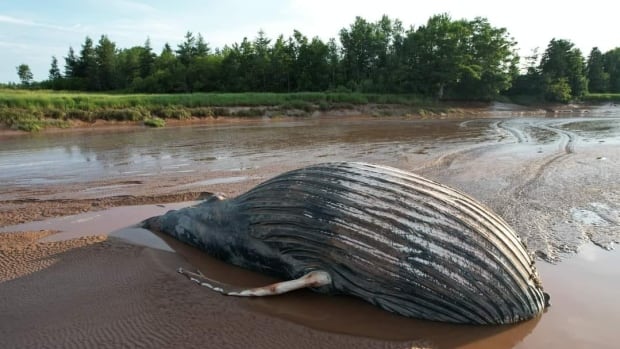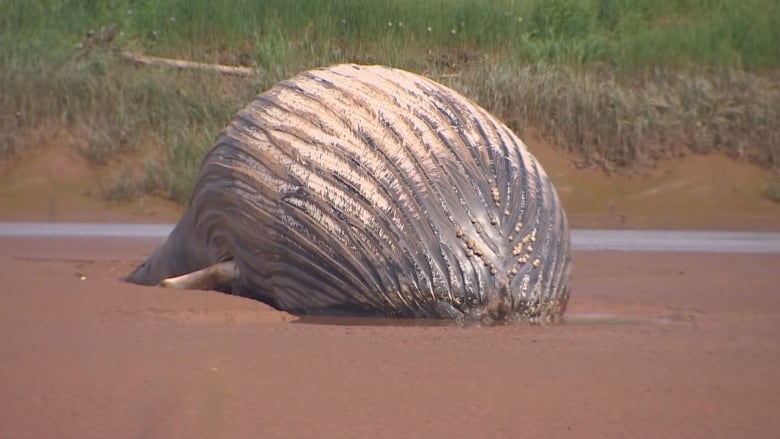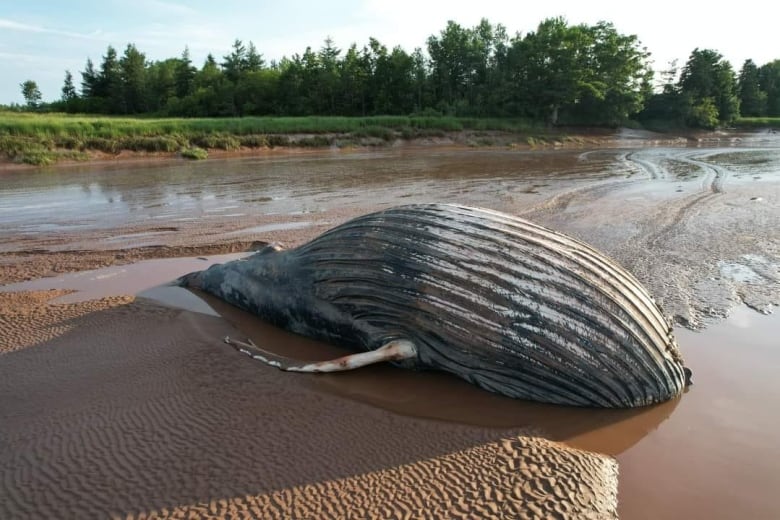
The death of a humpback whale found in the Stewiacke River on Thursday and other recent whale sightings are raising questions about climate change.
“I think that sits in the back of everybody’s minds when we’re starting to see species in weird places or even other species that are not normally here,” said Tonya Wimmer, the executive director of the Nova Scotia-based Marine Animal Response Society.
The humpback whale was spotted in the Shubenacadie River earlier this week.
On Monday, an endangered blue whale was seen in St. Marys Bay off Long Island, N.S. It appeared to be fine.
In June, a beached minke whale found in the Shubenacadie River was rescued by river rafters.

Wimmer said the society is monitoring changes in marine animals. She noted seeing bottlenose dolphins appearing more often in the area over the last few years, which she said was unusual.
“The ocean seems to be changing,” she said. “It’s warming, the food is changing, the food quality is changing, the animals themselves, their health, and so it does raise some alarms.”
Wimmer said the society became aware of the humpback whale in the Shubenacadie River on Canada Day. It was still alive at that point.
She said the group was “a bit astonished” that it was a humpback whale on the sandbars.
The whale was freed for a short period and appeared to have more energy, but Wimmer said it was found alive again the following day. It was stuck again and much weaker.
“They’re such big animals,” Wimmer said. “The ocean is the reason they can get to be so big because they don’t have to deal with gravity like we do on land.”
Wimmer said it’s not clear why the whale was in the Shubenacadie River to begin with, but it may have been following fish.
The RCMP asked people not to stop along the highway to look at the whale.
Gaylene Chase was among several people who gathered along a trail not far from the river. She heard about the whale and said she was curious.
“I’m kind of shocked that they’re so big,” Chase said. “I’ve never seen one before, so it’s quite something to see how large it is. I had no idea.”

Catherine Maltais drove in from Truro to see the whale.
“I feel like it is a little bit sad, but mostly I also think it’s kind of cool,” Maltais said. “It’s not something you see every day here in Stewiacke, especially this far inland.”
Blake Giroux flew a drone over the river to get a better view. “It’s definitely something different that I never thought I would get to see,” Giroux said.
Wimmer said a necropsy on the whale is not likely given its location. She said provincial and federal officials are being asked what can be done.
“It’s a very difficult river to have access to,” Wimmer said.
“There’s not a lot of roads down to it and it’s very muddy, which means we can’t work on that surface at all because it’s just too dangerous for our people.”
Blue whale sighting
The blue whale spotted Monday in the Bay of Fundy was just off the coast of Long Island in Digby County.
Mandy Crocker, who works on a whale-watching tour boat with Freeport Whale & Seabird Tours, said her cousin, captain Bradley Crocker, spotted the whale first. They were about 20 kilometres off their home port of Freeport, N.S., at the time.
“It was like nothing I’d ever seen before,” Mandy Crocker, who has been working on a whale-watching boat for 30 years, told CBC News.
Richard Sears, who studies marine mammals in the St. Lawrence River, said the blue whale likely could have been looking for food.
“For a good part of the year, these animals are looking for sources of food and so it may have already been to that part of the world, to the mouth of the Bay of Fundy, so to speak, and it may have remembered that it was a place where it came across some food that it preferred,” Sears told CBC News, adding blue whales eat krill.
Sears said it’s possible the blue whale could be long gone by now as they can travel relatively quickly.
“The animal may now be up along the Scotian Shelf or up by the Laurentian Channel … it doesn’t take long for them to cover a lot of ground,” he said.